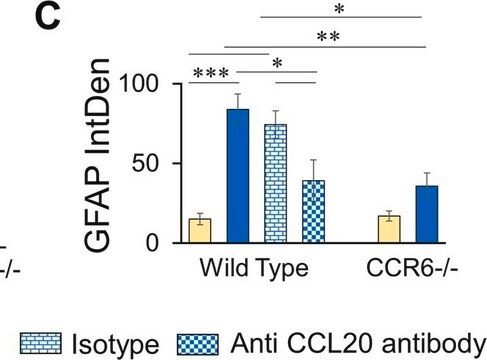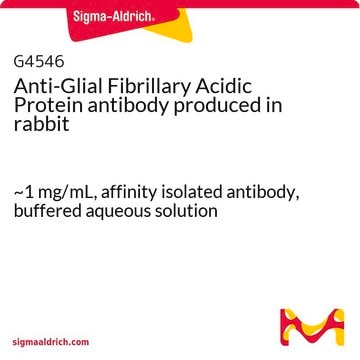G9269
Anti-Glial Fibrillary Acidic Protein antibody produced in rabbit
IgG fraction of antiserum, buffered aqueous solution
Synonyme(s) :
GFAP Antibody Sigma - Anti-Glial Fibrillary Acidic Protein antibody produced in rabbit, Gfap Antibody Sigma, Anti-GFAP
About This Item
Produits recommandés
Source biologique
rabbit
Niveau de qualité
Conjugué
unconjugated
Forme d'anticorps
IgG fraction of antiserum
Type de produit anticorps
primary antibodies
Clone
polyclonal
Forme
buffered aqueous solution
Espèces réactives
rat, human
Conditionnement
antibody small pack of 25 μL
Technique(s)
immunohistochemistry (formalin-fixed, paraffin-embedded sections): 1:80 using brain sections
microarray: suitable
western blot: 1:500 using brain extract
Numéro d'accès UniProt
Conditions d'expédition
dry ice
Température de stockage
−20°C
Modification post-traductionnelle de la cible
unmodified
Informations sur le gène
human ... GFAP(2670)
rat ... Gfap(24387)
Description générale
Spécificité
Immunogène
Application
- immunohistochemical staining at a working dilution of 1:400 using rat brain sections
- immunohistochemical staining of human brain tumor tissue specimens to identify the cells expressing AQP4 (Aquaporin-4)
- immunofluorescence using brain section from mice
Actions biochimiques/physiologiques
Forme physique
Stockage et stabilité
Clause de non-responsabilité
Vous ne trouvez pas le bon produit ?
Essayez notre Outil de sélection de produits.
Anticorps
Produit(s) apparenté(s)
Code de la classe de stockage
12 - Non Combustible Liquids
Classe de danger pour l'eau (WGK)
WGK 2
Point d'éclair (°F)
Not applicable
Point d'éclair (°C)
Not applicable
Certificats d'analyse (COA)
Recherchez un Certificats d'analyse (COA) en saisissant le numéro de lot du produit. Les numéros de lot figurent sur l'étiquette du produit après les mots "Lot" ou "Batch".
Déjà en possession de ce produit ?
Retrouvez la documentation relative aux produits que vous avez récemment achetés dans la Bibliothèque de documents.
Les clients ont également consulté
Notre équipe de scientifiques dispose d'une expérience dans tous les secteurs de la recherche, notamment en sciences de la vie, science des matériaux, synthèse chimique, chromatographie, analyse et dans de nombreux autres domaines..
Contacter notre Service technique












